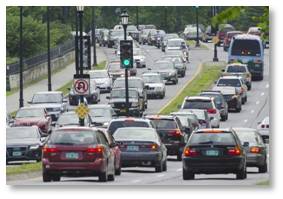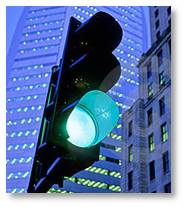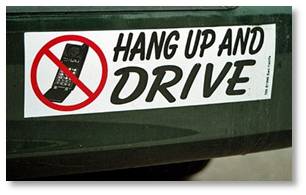I used to be a pretty polite driver. Sure, I like to go fast but I pay attention to the traffic flow and the drivers around me. When I’m at a stoplight I wait for the light to turn green and then I move ahead—just like we all learned in driver training. Increasingly, though, I’ve noticed that other drivers don’t do that. The light changes. The green light means go and the first car in line just sits there. One Mississippi, Two Mississippi. Three Mississippi. No movement. Nothing. Nada.
Stopped at the Green Light
 Why? Because the driver is using his phone.
Why? Because the driver is using his phone.
What? He’s talking, checking his email or—more likely—texting.
Who? It doesn’t matter who is texting him or who he’s texting back, the driver is still not paying any attention to his primary job—driving!
So I honk the horn—and it’s not a polite, ladylike toot, either. I honk because I’m annoyed. I have somewhere to go, too, and I don’t appreciate being delayed because the person in front of the line just HAS TO respond to that text message RIGHT AWAY! I know, I know, she thought it was OK because the car was stopped—so that’ doesn’t really constitute Texting While Driving. After I blow the horn, the car pulls ahead but slowly, as if the driver has to get her bearings back before moving.
Okay, sitting at a green light is my pet peeve. Bear with me.
Slowing Us All Down
Over the weekend we did a lot of driving and I noticed that this delay happened more often than not at stoplights. People who used to be paying attention to their driving and waiting for the light to change are now distracted and preoccupied with their smartphones.
The result is that two or three or even four cars that might have cleared the intersection don’t have enough time. So they sit at the red light and wait through another cycle before they can keep going. These drivers don’t know that they were delayed, of course, because they weren’t close enough to see the distracted driver at the front. This slows everyone down, though, and it has to be making traffic worse.
I can’t even imagine what kind of algorithm would be required to calculate the effect of a four-second delay at, say, 75 percent of intersections in a city with 2,753 stoplights. Does it mean that a one-hour rush now lasts 90 minutes? Do commuters take 10 minutes longer to get to work or go home at night? Can we figure out how much more gas we’re using by idling at stoplights? Or what the impact is on air quality? It makes my head hurt.
I’m not talking about texting while the car is moving—which is much, much worse. But, hey, if you started that message before the light turned and the rude woman behind you honked her horn, why would you stop just because the car is actually moving? You really have to finish the message, right?
And for what?
The Delusion of Multitasking
I’m as big a fan of multitasking as anyone. I can eat dinner, clip coupons and watch television at the same time. I can read and check out the news on TV while exercising on the treadmill. I listen to NPR while I cook dinner and I empty the dishwasher while the oven is heating up and the pasta water is boiling. But I’m really not doing all those things at once; I’m just moving from one thing to another in sequence, but efficiently. Research has shown that multitasking is a myth because our brains can only handle one task at a time.
 Here’s the sequence of processing for our distracted driver at the stoplight:
Here’s the sequence of processing for our distracted driver at the stoplight:
- Type text message
- Hear horn
- Register that he needs to do something
- Put phone down
- Check that light is green
- Make sure the intersection is clear
- Put foot on the accelerator
- Drive through intersection
It takes eight steps where only three would have been needed had the driver been focused on his main task. That’s why three or four cars in the line didn’t make it through the green light and have to sit through another cycle before they can move ahead.
But some things demand your undivided concentration. The lifeguard at the pool doesn’t read a magazine with swimmers in the water. A mother doesn’t let her toddler cross the street by himself while she checks her email. The pilot landing at an airport doesn’t do a crossword puzzle. Attention must be paid.
Attention Must Be Paid
Why is driving different? Is it because we’re in our own private cabins where others don’t intrude? Is it because we think we’re so smart we can get away with what we know is dangerous and probably illegal? Could it be we just don’t care about anyone else? Or is it because we’re really good a deluding ourselves that we can do it and everything will be fine because we’re special?
The worst driving day of the year is coming up this week as families make their way over the river and through the woods to a big Thanksgiving dinner. In New England, it’s going to be worse because of really bad weather. Here’s a thought: Turn your phone off and put it where you can’t reach it while you’re behind the wheel. That way you can focus on what you’re doing—and whether the light has turned green. You’ll make it to your destination on time—and so will everyone behind you. You’ll also have a better chance of getting there safely and that means everyone will have something to be thankful for.

